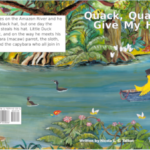Dickimaw Books Blog 
Every Little Counts 🔗

[Originally posted on Goodreads 2016-04-15.] Some years ago I attended a seminar at the Norwich Writers’ Centre given by a literary agent. (Incidentally, if you are a writer living in or near Norwich, there are some great resources available. It is, after all, England’s first UNESCO City of Literature.) This is an excellent way of finding out about the publishing industry. I had previously been to a talk given by a panel of agents and publishers at the University of East Anglia, which was informative, but it was in one of the lecture theatres, and so was more formal. The seminar at the Writers’ Centre was much more like a small group tutorial followed by brief one-to-one discussions with the agent. When we signed up for the seminar, we all had to provide an extract of our work (the first five pages, A4, double-spaced) and the cover letter we intended to send with submissions to agents. In the individual meetings, the agent gave her advice and suggestions on how to improve our pitch.
My extract was from the start of The Private Enemy. I had previously done a diploma course in creative writing, and the first 10,000 words of this novel had formed the majority of my portfolio. I had also been on other writing courses and writing groups so, by this time, the beginning of my novel had been pretty much analysed to death. (The remainder was subsequently critiqued in private lessons with my writing tutor.) The agent only had two comments to make about my extract before moving on to my query letter.
Her first comment was that she didn’t like science fiction. Fair enough. There are some genres that I don’t like, and if I’d been sending in the query letter for real I would’ve selected an agent who accepted SF. (Some of my writing peers who critiqued my work also didn’t like it, so I was well aware that a writer can’t please everyone.) Her second comment was a suggestion to cut out the mention of an open window, since she felt it was an irrelevant detail, and this brings me on to the topic of this post.
When writing a novel, every little detail must count towards something. This is more formally known as conservation of detail. If an item is described, it must have some significance. For example, a Chekhov’s Gun or some implement that’s later used needs to be mentioned so that the reader doesn’t say, “Hey, where did that come from?” In a mystery, clues need to be seeded throughout the novel otherwise the reader will feel cheated. Red herrings are also useful if the writer wants some misdirection. The reader should be able to assume that the characters and the world of the novel are like reality unless otherwise indicated. This means that the writer doesn’t need to tell the reader that all the characters are human and living on Earth. However, the writer does need to mention if the characters are, say, multi-tentacled lifeforms in another galaxy.
It’s boring for readers to trawl through endless pages of description that catalogues every button and stitch of clothes or every leaf and blade of grass in the surroundings. This doesn’t mean that the opposite extreme is good. A total absence of description gives the impression of formless beings floating around in the ether. The reader can assume that the characters are wearing clothes as they walk around the city, but a few details (such as a pinstriped suit or a hoodie and ripped jeans) can help to form an image in the reader’s mind. The reader can assume that the city has roads and buildings, but a few pertinent details can help to form the world of the novel.
To return to the window example, what does an open window add to a story? There could be an unseen character behind it, eavesdropping. It could be used as an unorthodox method of entry. It could cause a draught that blows an important scrap of paper behind a piece of furniture. It could signify a need for ventilation that might not otherwise be taken for granted (for example, to show it’s stifling hot or to reduce smoke or gas inhalation). Alternatively, it could be just an open window. In which case it needs to be cut because it’s a little detail that doesn’t count.
Critiquing is a useful way of detecting these unnecessary details. (In case you’re not familiar with the writing process, book reviews are for the benefit of potential readers for works that have already been or are about to be published. Critiquing is a tool for writers to help improve a work in progress.) Feedback can highlight the need for pruning. The critiquer may simply flag instances, but another more interesting phenomenon may occur. If the critiquer knows that the writer is in the habit of applying conservation of detail, any accidental slips can sometimes be interpreted as significant. When this happens to me, it usually triggers one of two reactions: oops, better cut that or hmm, that’s given me an idea. The latter is like discovering some coins down the back of the sofa, which is rather fun.
If you have hours to spare and you don’t mind being sucked into the black hole of TV Tropes, you can read more about the Law of Conservation of Detail over there.
Next Post
Previous Post
Recent Posts
 There are a growing number of digital historians who are interested in documenting old computing systems from the twentieth century, but much of the information has been lost and coincident names can make it hard to search. This article is about the RISC OS ARMTeX distribution, which provided TeX and LaTeX for the ARM-powered Acorn computers in the 1990s.
There are a growing number of digital historians who are interested in documenting old computing systems from the twentieth century, but much of the information has been lost and coincident names can make it hard to search. This article is about the RISC OS ARMTeX distribution, which provided TeX and LaTeX for the ARM-powered Acorn computers in the 1990s. The DRM-free ebook retailer SmashWords has its annual Summer/Winter sale from 1st – 31st July 2025. My crime novel “The Private Enemy” and children’s illustrated story “The Foolish Hedgehog” both have a 50% discount, and my crime fiction short stories “I’ve Heard the Mermaid Sing”, “Unsocial Media”, “Smile for the Camera”, and “The Briefcase” have a 100% discount (i.e. free!) for the duration of the sale. Did you know that you can gift ebooks on SmashWords?
The DRM-free ebook retailer SmashWords has its annual Summer/Winter sale from 1st – 31st July 2025. My crime novel “The Private Enemy” and children’s illustrated story “The Foolish Hedgehog” both have a 50% discount, and my crime fiction short stories “I’ve Heard the Mermaid Sing”, “Unsocial Media”, “Smile for the Camera”, and “The Briefcase” have a 100% discount (i.e. free!) for the duration of the sale. Did you know that you can gift ebooks on SmashWords? If you have read my short story Smile for the Camera, did you notice that the ending could have two possible interpretations? (No spoilers please!) As a writer, it’s always difficult to tell if something is too obvious or too obscure. If you need a hint, consider the naming scheme and remember that not everyone is what they say or imply that they are.
If you have read my short story Smile for the Camera, did you notice that the ending could have two possible interpretations? (No spoilers please!) As a writer, it’s always difficult to tell if something is too obvious or too obscure. If you need a hint, consider the naming scheme and remember that not everyone is what they say or imply that they are. The Ex-Cathedra writing group were delighted to present a cheque for £1,400 to St Martins Housing Trust during their collection at Tesco Harford Bridge on 6th December 2024. The money was raised from sales of the book Tales for Our Times, an anthology of short stories written by the group. The cheque was received by Ian Hanwell on behalf of St Martins. Many thanks to the support of everyone who purchased a copy and to the staff at Tesco Harford Bridge for allowing us to make the presentation there.
The Ex-Cathedra writing group were delighted to present a cheque for £1,400 to St Martins Housing Trust during their collection at Tesco Harford Bridge on 6th December 2024. The money was raised from sales of the book Tales for Our Times, an anthology of short stories written by the group. The cheque was received by Ian Hanwell on behalf of St Martins. Many thanks to the support of everyone who purchased a copy and to the staff at Tesco Harford Bridge for allowing us to make the presentation there. Search Blog
📂 Categories
- Autism
- Books
- Children’s Illustrated Fiction
- Illustrated fiction for young children: The Foolish Hedgehog and Quack, Quack, Quack. Give My Hat Back!
- Creative Writing
- The art of writing fiction, inspiration and themes.
- Crime Fiction
- The crime fiction category covers the crime novels The Private Enemy and The Fourth Protectorate and also the crime short stories I’ve Heard the Mermaid Sing and I’ve Heard the Mermaid Sing.
- Fiction
- Fiction books and other stories.
- Language
- Natural languages including regional dialects.
- (La)TeX
- The TeX typesetting system in general or the LaTeX format in particular.
- Music
- Norfolk
- This category is about the county of Norfolk in East Anglia (the eastern bulgy bit of England). It’s where The Private Enemy is set and is also where the author lives.
- RISC OS
- An operating system created by Acorn Computers in the late 1980s and 1990s.
- Security
- Site
- Information about the Dickimaw Books site.
- Software
- Open source software written by Nicola Talbot, which usually has some connection to (La)TeX.
- Speculative Fiction
- The speculative fiction category includes the novel The Private Enemy (set in the future), the alternative history novel The Fourth Protectorate, and the fantasy novel Muirgealia.
🔖 Tags
- Account
- Alternative History
- Sub-genre of speculative fiction, alternative history is “what if?” fiction.
- book samples
- Bots
- Conservation of Detail
- A part of the creative writing process, conservation of detail essentially means that only significant information should be added to a work of fiction.
- Cookies
- Information about the site cookies.
- Dialect
- Regional dialects, in particular the Norfolk dialect.
- Docker
- Education
- The education system.
- Ex-Cathedra
- A Norfolk-based writing group.
- Fantasy
- Sub-genre of speculative fiction involving magical elements.
- File formats
- FlowframTk
- A vector graphics application written in Java that can export to pgf picture drawing code but can also be used to construct frames for use with the flowfram package. Home page: dickimaw-books.com/software/flowframtk. (FlowframTk was originally called JpgfDraw.)
- Hippochette
- A pochette (pocket violin) with a hippo headpiece.
- History
- I’ve Heard the Mermaid Sing
- A crime fiction short story (available as an ebook) set in the late 1920s on the RMS Aquitania. See the story’s main page for further details.
- Inspirations
- The little things that inspired the author’s stories.
- Linux
- Migration
- Posts about the website migration.
- Muirgealia
- A fantasy novel. See the book’s main page for further details.
- News
- Notifications
- Online Store
- Posts about the Dickimaw Books store.
- Quack, Quack, Quack. Give My Hat Back!
- Information about the illustrated children’s book. See the book’s main page for further details.
- Re-published
- Articles that were previously published elsewhere and reproduced on this blog in order to collect them all together in one place.
- Sale
- Posts about sales that are running or are pending at the time of the post.
- Site settings
- Information about the site settings.
- Smile for the Camera
- A cybercrime short story about CCTV operator monitoring a store’s self-service tills who sees too much information.
- Story creation
- The process of creating stories.
- TeX Live
- The Briefcase
- A crime fiction short story (available as an ebook). See the story’s main page for further details.
- The Foolish Hedgehog
- Information about the illustrated children’s book. See the book’s main page for further details.
- The Fourth Protectorate
- Alternative history novel set in 1980s/90s London. See the book’s main page for further details.
- The Private Enemy
- A crime/speculative fiction novel set in a future Norfolk run by gangsters. See the book’s main page for further details.
- Unsocial Media
- A cybercrime fiction short story (available as an ebook). See the story’s main page for further details.
- World Book Day
- World Book Day (UK and Ireland) is an annual charity event held in the United Kingdom and the Republic of Ireland on the first Thursday in March. It’s a local version of the global UNESCO World Book Day.
- World Homeless Day
- World Homeless Day is marked every year on 10 October to draw attention to the needs of people experiencing homelessness.


